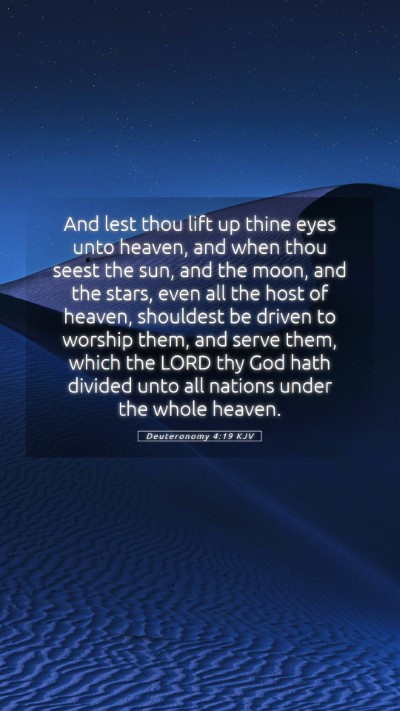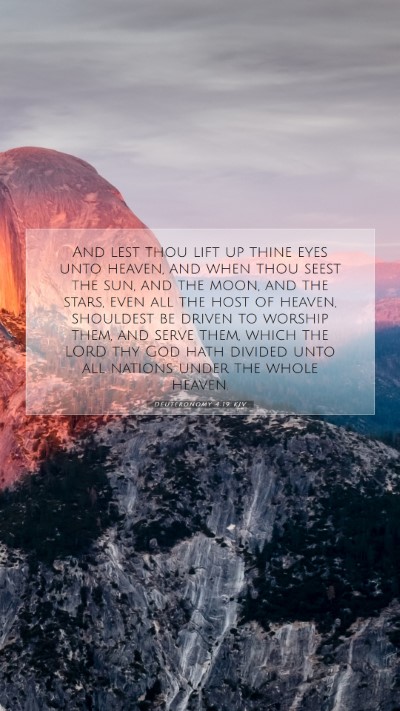Bible Verse Interpretation: Deuteronomy 4:19
Deuteronomy 4:19 states, “And lest thou lift up thine eyes unto heaven, and when thou seest the sun, and the moon, and the stars, even all the host of heaven, shouldest be driven to worship them, and serve them, which the Lord thy God hath divided unto all nations under the whole heaven.”
This verse serves as a divine warning against idolatry and the worship of celestial bodies, emphasizing God's sovereignty over creation.
Meaning of the Verse
In Deuteronomy 4:19, several crucial themes are addressed:
- Idolatry: The verse cautions against the inclination to worship heavenly bodies, which was a prevalent practice in ancient cultures.
- Divine Authority: It underscores the uniqueness of the Lord God, who has dominion over the entire universe.
- Human Vulnerability: This highlights the tendency of humans to be swayed by what they see, which can lead to misguided worship.
Commentary Insights
Insights from public domain commentaries provide a richer understanding of this passage:
- Matthew Henry: He emphasizes the danger of being captivated by the beauty of creation and forgetting the Creator. Henry warns that worshiping creation instead of God detracts from the divine plan and leads to spiritual ruin.
- Albert Barnes: Barnes highlights the distinction between worshiping the Creator versus the creation. He notes that the Israelites were to remain faithful to God and not allow their observation of the heavens to turn into idolatry. This reflects a broader teaching on prioritizing one's faith above the allure of nature.
- Adam Clarke: Clarke discusses the broader implications of this verse in the context of the surrounding nations. He points out that the worship of celestial bodies was common among other peoples, making this warning particularly pertinent for Israel to avoid conforming to surrounding practices.
Application to Daily Life
In modern contexts, this verse invites reflection on how one prioritizes their spiritual life:
- Value of Worship: It challenges individuals to consider if their worship is directed toward God or if it is distracted by the 'heavens'—that is, things of this world that may draw their attention away from God.
- Focus on God: This passage encourages believers to actively engage in Bible study insights, recognizing the importance of directing worship towards God alone.
- Community Reflection: In Bible study groups, discussions can focus on how society often idolizes various elements of creation—be it nature, fame, or success—over their relationship with God.
Cross References
Related verses that illuminate the themes found in Deuteronomy 4:19 include:
- Romans 1:25: “Who changed the truth of God into a lie, and worshipped and served the creature more than the Creator, who is blessed for ever. Amen.”
- Isaiah 47:13: “Thou art wearied in the multitude of thy counsels: let now the astrologers, the stargazers, the monthly prognosticators, stand up, and save thee from these things that shall come upon thee.”
- Psalms 19:1: “The heavens declare the glory of God; and the firmament sheweth his handywork.”
Further Study and Reflection
For those seeking to deepen their understanding of this verse:
- Engage in Online Bible Study: Utilize resources and tools that provide lessons on idolatry and the sovereignty of God.
- Historical Context Analysis: Study the cultural practices of ancient Israelites to understand the relevance of this warning in their context.
- Prayerful Reflection: Spend time in prayer and meditation on how this verse can apply to modern life and personal worship practices.
Conclusion
In summary, Deuteronomy 4:19 serves as a significant reminder of the importance of worshiping God above all else. Through scripture analysis and biblical exegesis, readers can cultivate a deeper understanding of this passage. Engaging with the teachings of notable commentaries enhances one’s appreciation of the text and its implications for both historical and contemporary believers. As we navigate our spiritual journeys, let us heed the call to focus our worship on the one true God and avoid the distractions that lead away from His glory.


